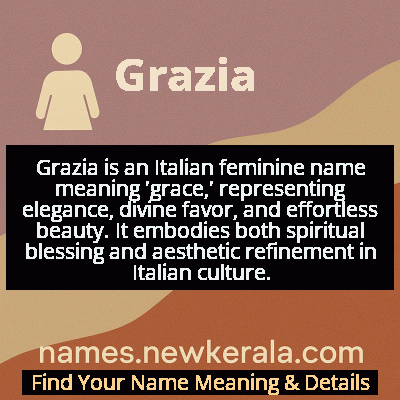Grazia Name Meaning & Details
Origin, Popularity, Numerology Analysis & Name Meaning of Grazia
Discover the origin, meaning, and cultural significance of the name GRAZIA. Delve into its historical roots and explore the lasting impact it has had on communities and traditions.
Name
Grazia
Gender
Female
Origin
Italian
Lucky Number
8
Meaning of the Name - Grazia
Grazia is an Italian feminine name meaning 'grace,' representing elegance, divine favor, and effortless beauty. It embodies both spiritual blessing and aesthetic refinement in Italian culture.
Grazia - Complete Numerology Analysis
Your Numerology Number
Based on Pythagorean Numerology System
Ruling Planet
Saturn
Positive Nature
Ambitious, efficient, realistic, and authoritative.
Negative Traits
Materialistic, stressed, confrontational, and can be overly ambitious.
Lucky Colours
Dark blue, black.
Lucky Days
Saturday.
Lucky Stones
Blue sapphire, amethyst.
Harmony Numbers
2, 4, 6.
Best Suited Professions
Business leaders, managers, financial services, law enforcement.
What People Like About You
Leadership, determination, organizational skills.
Famous People Named Grazia
Grazia Deledda
Writer
Nobel Prize in Literature (1926)
Grazia Neri
Photojournalist
Founded Italy's first major photo agency
Grazia Francescato
Politician
Former leader of Italian Green Party
Grazia Di Michele
Singer
Influential Italian folk and pop musician
Name Variations & International Equivalents
Click on blue names to explore their detailed meanings. Gray names with will be available soon.
Cultural & Historical Significance
The name's cultural resonance extends beyond religion to encompass Italy's rich artistic heritage. In Renaissance art criticism, grazia described the quality that made a work of art appear effortless and naturally beautiful, a concept championed by artists like Raphael and writers like Baldassare Castiglione. This artistic connection gives the name an intellectual and creative dimension, linking it to Italy's golden age of cultural achievement. Even in modern times, Grazia represents the Italian ideal of living with style and substance - combining aesthetic appreciation with deep cultural values.
Extended Personality Analysis
Women named Grazia are often perceived as embodying the grace and elegance their name suggests. They typically exhibit natural poise, emotional intelligence, and a calming presence that puts others at ease. Their grace extends beyond mere physical elegance to include mental flexibility, diplomatic communication skills, and the ability to navigate complex social situations with tact and charm. Grazias are often seen as harmonizers who bring balance to their environments, combining strength with gentleness in a way that inspires trust and admiration.
These individuals tend to approach challenges with a composed demeanor and possess an innate sense of timing - knowing when to act and when to wait, when to speak and when to listen. This combination of inner strength and outward grace makes them natural leaders who lead through inspiration rather than force. They often excel in roles requiring mediation, creative problem-solving, and building consensus. While they may appear reserved initially, Grazias typically possess deep emotional reservoirs and strong convictions, which they express with measured eloquence rather than dramatic intensity. Their strength lies in their ability to influence through quiet confidence and genuine connection.
Modern Usage & Popularity
In contemporary Italy, Grazia maintains steady popularity as a classic choice that bridges traditional values with modern sophistication. While not among the top 10 most popular names, it consistently appears in the top 100-200 range, favored by parents seeking a name with cultural depth and timeless elegance. The name has seen renewed interest among younger generations who appreciate its connection to Italian artistic heritage and its representation of effortless style. Internationally, Grazia has gained recognition through Italian diaspora communities and the global success of Grazia magazine, making it an appealing choice for parents worldwide seeking an authentic Italian name that travels well across cultures while maintaining its distinctive Mediterranean charm. Its usage patterns show it's particularly popular among educated, urban families who value cultural heritage alongside contemporary relevance.
Symbolic & Spiritual Meanings
Symbolically, Grazia represents the seamless integration of strength and beauty, embodying the concept that true power lies in gentle influence rather than forceful domination. It symbolizes the flow of life's blessings and the ability to move through challenges with fluid adaptability. The name carries connotations of divine favor and protection, suggesting a life guided by higher principles and moral elegance. In metaphorical terms, Grazia represents the art of living well - balancing action with reflection, strength with compassion, and individuality with social harmony. It symbolizes the ideal of achieving one's goals through persuasion and inspiration rather than coercion, making it a name that embodies both spiritual depth and worldly sophistication while representing the graceful navigation of life's complexities.

